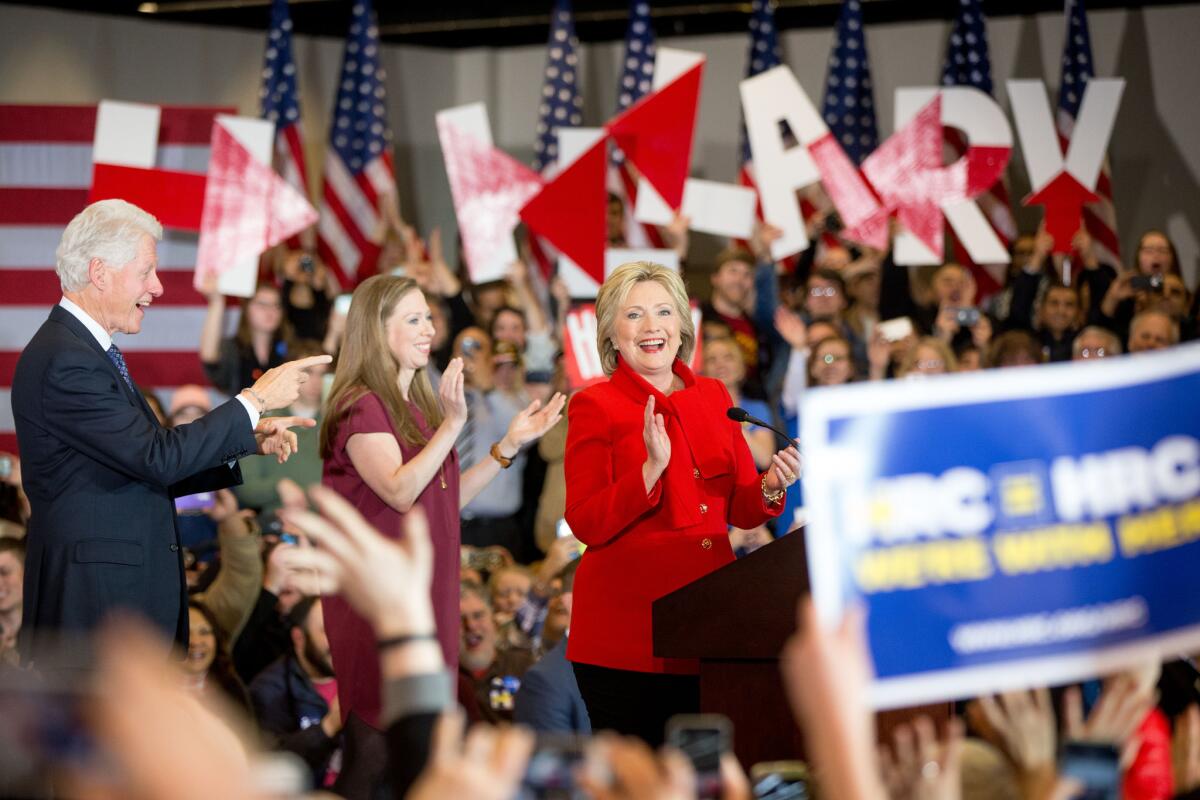Op-Ed: Iowa manages to defy expectations, even as the favorites win

Democratic presidential candidate Hillary Clinton, accompanied by former President Bill Clinton and their daughter Chelsea Clinton, arrives onstage at her caucus night rally at Drake University in Des Moines, Iowa.
- Share via
Even when the top results aren’t really a surprise, the Iowa caucuses manage to defy expectations.
For weeks, Hillary Clinton and Bernie Sanders have been virtually tied in the polls, so it shouldn’t have been astonishing that they finished neck-and-neck Monday night.
And yet, Clinton’s campaign aides managed to turn a virtual tie into a psychological defeat by incautiously spreading word that they believed she had clearly won. Clinton delivered a not-quite-victory speech that claimed she has always yearned for a difficult campaign. “I am excited about really getting into the debate with Sen. Sanders,” she said. Behind her, her husband, Bill Clinton, didn’t look excited at all.
Now the Democrats may have a long, two-candidate race ahead of them. If that’s what Hillary Clinton secretly wanted, she’s got her wish.
On the Republican side, Ted Cruz had been on top of most polls until two weeks ago, when Donald Trump overtook him. But the smart money said Cruz’s superior organization and committed supporters would prove decisive, and the smart money was right.
Instead, it was Trump who provided a surprise: Handed a stinging defeat, he was gracious, statesmanlike and upbeat. “We finished second, and I want to tell you something: I’m just honored,” he said.
Meanwhile, Marco Rubio, who finished third, delivered an ebullient, hopeful victory speech that made it sound as if he had come in first. “For months, they told us we had no chance,” he said. “I will be our nominee.” Translation: It’s a three-man race now — Cruz, Trump, Rubio.
Iowa’s caucuses are a strange, unrepresentative way to begin the process of selecting major party candidates. Iowa’s demographics don’t mirror the rest of the country, or even the rest of the Midwest. Two-hour-long caucuses in the dead of winter ensure that voter participation is low.
But the exercise still had a clarifying effect. At least two unsuccessful candidates, Mike Huckabee and Martin O’Malley, dropped out.
And the shape of a newly streamlined contest was made clear: Two closely matched contenders for the Democrats and — if Rubio can consolidate the “establishment” wing of his party — three for the GOP.
Follow the Opinion section on Twitter @latimesopinion and Facebook
More to Read
A cure for the common opinion
Get thought-provoking perspectives with our weekly newsletter.
You may occasionally receive promotional content from the Los Angeles Times.











